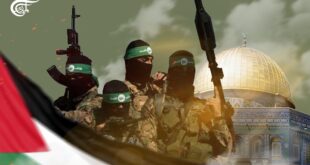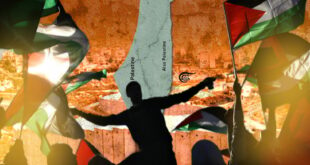Palestine has been under Israeli military occupation for decades. The author, who spent three months at the beginning of 2018 in the West Bank, writes about his experiences.

Al-Quds University. Credit: Flickr/Dan Brickley
This is the first in a series of articles.
Unknown Palestinian: “Where are you from?”
Me: “From India.”
Palestinian: “Welcome to Palestine! Amitabh, Shahrukh, Aamir… we love India!”
These are typical conversations I had over and over again in Palestine. I lost count of how many times I was asked, “Where are you from?” The warmth that followed on learning that I was Indian was staggering. Everywhere I visited, people would call out to me: when I went grocery shopping, when I stopped for coffee at street side cafés, and sometimes when I was simply walking by. The next sentence was unfailingly, “Welcome!” or “Welcome to Palestine!” and at times the even more personal, “Indians are always welcome in Palestine.”
Once, I stopped to photograph the entrance to the Al-Quds University in Abu Dis, a small town that neighbours Jerusalem. I found that security guards posted at universities tend to be wary of strangers. (It is for good reason. Universities get violently raided by the Israeli military with alarming regularity, sometimes by their undercover units (as happened once while I was there), tear gassing, and vandalising their campuses). When the security came over looking somewhat hostile, I asked if I was allowed to take the photograph. He asked where I was from and on learning I was Indian, “Welcome! Take as many photographs as you want.
Every independent travel blog and travel guide I had browsed before the trip spoke of how warm and welcoming the Palestinians are. Yet, the warmth I experienced – for no other merit but being Indian – was unusual even by those standards. There are several reasons for the deep connect that Palestinians feel about India, and they run deep.
 The popularity of Bollywood and Indian soaps in Palestine is astounding. Free-to-air TV includes a lot of Indian programming. Amitabh, Shahrukh and Aamir are particularly well known and loved. “Amitabh… great man!” was a sentiment I heard more than once. A young woman at the Aida refugee camp in Bethlehem once scolded me for a mildly negative view I expressed about an actor she liked. There were times when they actually started singing Bollywood songs, getting even the pronunciation and accent spot on.
The popularity of Bollywood and Indian soaps in Palestine is astounding. Free-to-air TV includes a lot of Indian programming. Amitabh, Shahrukh and Aamir are particularly well known and loved. “Amitabh… great man!” was a sentiment I heard more than once. A young woman at the Aida refugee camp in Bethlehem once scolded me for a mildly negative view I expressed about an actor she liked. There were times when they actually started singing Bollywood songs, getting even the pronunciation and accent spot on.
One reason for this affinity for Bollywood is that there are indeed a lot of commonalities in cultural traits between India and Palestine. Arranged marriages, joint family structures and relationships among family members are cases in point.
Education
India has hosted many Palestinian students at universities around the country. Following a scientific seminar I gave at the An-Najah university in Nablus, one physics faculty member from the audience came up to me and announced, “I lived in India for a bit. Eleven years.” He had done his Bachelors, Masters and PhD in physics in India. He had studied at or visited several prominent research centers including TIFR in Mumbai, IISc in Bangalore, and the IITs in Mumbai and Chennai. He spoke Kannada because he had studied at Mysore University. He invited me home tospend the weekend with him and his family in his small town called Anabda. As we drove through the village, he pointed out person after person who had received their degrees in India. In a tour of their physics lab facilities, I found that a lot of their equipment came from Indian manufacturers. They apparently cost a fraction of the price of German manufacturers for much the same quality. However, my most memorable meeting was with a fruit seller at a vegetable market in Ramallah. He had spent eight years studying and living in India in the late ‘80s and early ‘90s. He said that India had been the best time of his life. Few things could be as convincing about his love for India as the nostalgia and passion with which he described his motorbike trip from Mumbai to Goa. “I lived like a king”, he told me.
India continues to collaborate on education and technology projects in Palestine to date. Some examples are the India-Palestine Centre for Excellence in Information and Communications Technology at the Al-Quds University and the Palestine-India Techno Park at Birzeit University.
The Indian representation to Palestine in Ramallah also lists some projects Indiaiscurrently supporting in Palestine: “India has been extending various forms of economic assistance to the Palestinian people. Government of India supported the construction of Jawaharlal Nehru Library at the Al Azhar University in Gaza city and the Mahatma Gandhi Library-cum-Student Activity Centre at the Palestine Technical College at Deir Al Balah in the Gaza Strip. India provided a plot of land and constructed a chancery building for the Embassy of Palestine in New Delhi.”

A joint India-Palestine venture at the Al-Quds University.
Health
We met a farmer near Jericho who told us that his wife was awaiting a match for an organ transplant procedure in India. I believe it was being funded by Palestinian social security but did not find out if they were being offered any concession by the hospital. Even if not, the cost of medical procedures in India are a fraction of that in Europe or North America. Prime Minister Modi too, on his recent trip, announced the setting up of a super specialty clinic near Bethlehem.
Shared history and political support
The long history of political support for the Palestinian cause is yet another reason for the warmth that Palestinians feel towards India and Indians. India not just voted against the UN partition plan of Palestine in November 1947 (viz. soon after India’s independence), it was also one of only three countries without a Muslim majority (India, Cuba and Greece) to do so. India was the first non-Arab country to recognise the State of Palestine in 1988 and has consistently voted in favour of Palestine in UN resolutions over the past several decades.

Graffiti on the Palestinian side of the immense Segragation Barrier a.k.a. Apartheid Wall that Israel has constructed effectively rendering Palestinians prisoners on their own land.
Palestinians feel a deep sense of shared history with India and South Africa on account of their colonial past. Contrary to widespread perception, a large part of Palestine’s struggle for independence has involved non-violent resistance. They hold Gandhi in high – almost personal – regard. India gained independence from the British in 1947, and South African Apartheid ended in the early 1990s. Yet Palestine remains under a brutal occupation today. Gandhi wrote, “Palestine belongs to the Arabs in the same sense that England belongs to the English or France to the French. It is wrong and inhuman to impose the Jews on the Arabs.” Palestinians relate closely to Indians on several levels. While the majority of Palestinians may be Muslim, their regard for India transcends religion. It has to do with a sense of shared cultural traits, shared history, shared suffering and perhaps the hope that they would, one day, find freedom from oppression in the manner that India did.
Chirag Dhara is a climate physicist with PhDs in theoretical physics and earth science. He is keenly interested in the Palestinian situation and visited the occupied West Bank for three months in early 2018 in solidarity with the Palestinians.
 Arabgazette Arabgazette Magazine
Arabgazette Arabgazette Magazine


